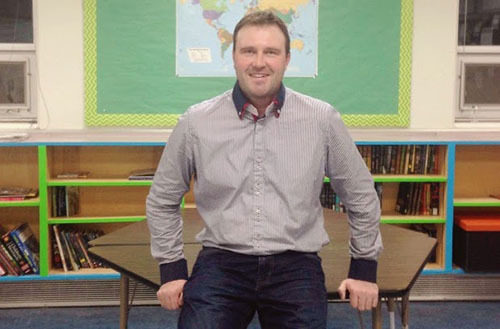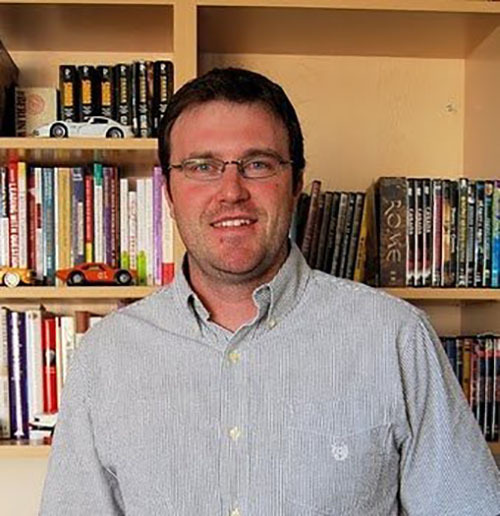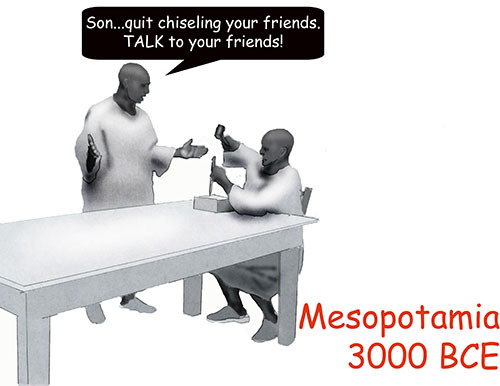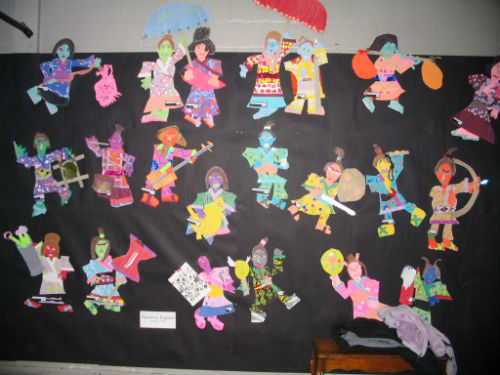
We miss our Top 12 Global Blogger Joe Bower very much. Joe, a progressive and gifted educator from Red Deer, Alberta, Canada recently died of a massive heart attack at the age of 37. Through his regular contributions to the Top 12 Global Teacher Blogger series each month, Joe inspired our team enormously as well as thousands of educators around the world.
On a personal note, I was delighted to discover I shared a mutual passion with Joe when I worked with him on our November 2015 blog that focused on games that really help students learn. During the back and forth on his article, he asked me if he could write about board games (versus video games). He explained that he’d been working in a Children’s Inpatient Psychiatric Assessment Unit, and he found that board games were a great way in the first instance to establish a trusting, caring relationship with an emotionally challenged child. Being a lover and believer all my life in the many merits of board games, Joe’s idea completely resonated with me. He wrote in his “For the Love of Learning” blog on this topic and noted that beyond being an important relationship builder, this form of play was also “a great way of assessing a children’s skills including their creativity, colaboración, adaptabilidad, resistencia, el pensamiento crítico, la resolución de problemas, paciencia, alfabetización y aritmética.”
And so Joe – thank you for your amazing mind, your compassionate soul, your ideas, your commitment to education, all of which will live on through your legacy. “For the Love of Learning” from you and from each other, so that we may ultimately help learners everywhere to shine, we shall continue to share teachers’ perspectives each month as I know you would want us to.
Este mes, we posed this question to our Top 12 Global bloggers Maestro: What lessons can teachers offer to designers of software for the classroom? New learning tools can mean new ways to engage students, but this month our experts from classrooms around the world have shared their ideas and feedback on this topic. So listen up Silicon Valley!
Richard Wells’ (@EduWells) book on New Zealand education will be released in 2017. In his blog this month, Richard emphasizes the importance of making technology adaptable to the learner’s needs saying, “successful apps need to reflect a world where everyone expects to be able to personalize their own experience.” Leer más.
Paulina Hawkins (PaulineDHawkins) autor de Core Poco frecuentes: 25 Ways to Help Your Child Succeed In a Cookie Cutter Educational System, notes that students are not easily fooled: “Students are not impressed with cheesy gimmicks or things that try to imitate what they like but in an “educativo” way.” High school students in particular are sophisticated consumers and should be treated as such by tech manufacturers. She also says that students learn at different rates and educational programs should be easily adjustable to different complexity settings. Leer más.
In his blog, Adam Steiner (steineredtech) observes that while there are great programs that give students the power to create amazing multimedia content, “what has lagged behind are tools that support specific subject areas. There are too few options for maximizing student engagement in social studies, English, ciencia, and math.” He urges education tech companies to never overlook the importance of content. Leer más.
Vicki Davis (coolcatteacher) brings to light the important fact that different kids have different achievement motivators. Some students value socialization or exploration while others need success markers like status upgrades and leader boards. She also emphasizes the consideration of aesthetics: “Face it, many education technology platforms need a face lift.” Leer más.
Todd Finley (finleyt) believes that a good way for tech companies to make sure they meet the needs of students and educators is to actually invite education researchers, niños, and teachers to help the design team. He also thinks that software should not distract or take away from learning. “Software should be intuitive enough for instructors to learn quickly. Más importante, the tool should not add to students’ cognitive load.” Leer más.
In his post, Craig Kemp (mrkempnz) calls attention to the social needs of students. Students are human animals with the strong urge to interact with each other. They are best engaged by technology that consists of some form of communication. Leer más.
Tom Bennett (@ Tombennett71), Joe Bower (joe_bower), Susan Bowles (FloridaKteacher), Lisa Currie (RippleKindness), Vicki Davis (coolcatteacher), Todd Finley (finleyt), Paulina Hawkins (PaulineDHawkins), Craig Kemp (mrkempnz), Karen Lirenman (KLirenman), Adam Steiner (steineredtech), Silvia Tolisano (langwitches) y Richard Wells (@EduWells) son La Búsqueda Global para la Educación 2014 Top 12 Global bloggers Maestro.


Únete a mí y reconocidos a nivel mundial los líderes de opinión, incluyendo a Sir Michael Barber (Reino Unido), DR. Michael Bloquear (EE.UU.), DR. Leon Botstein (EE.UU.), Profesor Clay Christensen (EE.UU.), DR. Linda Darling-Hammond (EE.UU.), DR. MadhavChavan (India), El profesor Michael Fullan (Canada), El profesor Howard Gardner (EE.UU.), El profesor Andy Hargreaves (EE.UU.), Profesor Yvonne Hellman (Países Bajos), Profesor Kristin Helstad (Noruega), Jean Hendrickson (EE.UU.), Profesor Rose Hipkins (Nueva Zelanda), Profesor Cornelia Hoogland (Canada), Honorable Jeff Johnson (Canada), Señora. Chantal Kaufmann (Bélgica), DR. EijaKauppinen (Finlandia), Secretario TapioKosunen Estado (Finlandia), Profesor Dominique Lafontaine (Bélgica), El profesor Hugh Lauder (Reino Unido), Señor Ken Macdonald (Reino Unido), Profesor Geoff Masters (Australia), Profesor Barry McGaw (Australia), Shiv Nadar (India), Profesor R. Natarajan (India), DR. PAK NG (Singapur), DR. Denise Papa (Estados Unidos), Sridhar Rajagopalan (India), DR. Diane Ravitch (EE.UU.), Richard Wilson Riley (EE.UU.), Sir Ken Robinson (Reino Unido), Profesor Pasi Sahlberg (Finlandia), El profesor Manabu Sato (Japón), Andreas Schleicher (PISA, OCDE), DR. Anthony Seldon (Reino Unido), DR. David Shaffer (EE.UU.), DR. Kirsten Immersive Are (Noruega), Canciller Stephen Spahn (EE.UU.), Yves Theze (LyceeFrancais EE.UU.), Profesor Charles Ungerleider (Canada), Profesor Tony Wagner (EE.UU.), Sir David Watson (Reino Unido), Profesor Dylan Wiliam (Reino Unido), DR. Marcos Wormald (Reino Unido), Profesor Theo Wubbels (Países Bajos), El profesor Michael Young (Reino Unido), y el profesor Zhang Minxuan (De China) a medida que exploran las cuestiones de educación cuadro grande que todas las naciones se enfrentan hoy.
La Búsqueda Global para la Educación Comunitaria Página
C. M. Rubin es el autor de dos ampliamente leído serie en línea por la que recibió un 2011 Premio Upton Sinclair, “La Búsqueda Global para la Educación” y “¿Cómo vamos a Leer?” Ella es también el autor de tres libros más vendidos, Incluido The Real Alice in Wonderland, es el editor de CMRubinWorld, y es una Fundación Disruptor Fellow.
Siga C. M. Rubin en Twitter: www.twitter.com/@cmrubinworld





Comentarios recientes